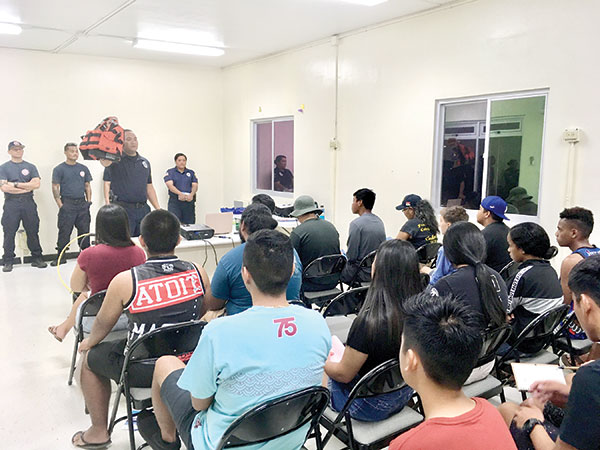Learning the ropes of boating safety

Representatives of the Department of Fire and Emergency Medical Services explain the importance of safety procedures when fishing, including wearing life jackets, to the members of the Saipan Fishermen’s Association Youth Fishing Club last Saturday, at the Head Start conference room on Capital Hill. (IVA MAURIN)
As part of a bigger push to get the youth in the CNMI hooked on fishing, the Saipan Fishermen’s Association is making sure that these young fishermen are prepared when they go out to sea.
Members of the SFA Youth Fishing Club—students from Saipan Southern High School, Marianas High School, Kagman High School, and Da’ok Academy—were taught the rudiments of boating safety last Saturday, at the Head Start conference room on Capital Hill.
They learned basic cardio-pulmonary resuscitation and first aid from the Department of Fire and Emergency Medical Services, as well as boating safety from the Department of Public Safety’s Boating Safety Section.
A DFEMS search and rescue unit officer shared with the students safety procedures, including how the DFEMS does its searches, as well as safety equipment needed to ensure that, if ever there is an emergency in the open ocean, DFEMS will be able to find them.
The DFEMS officer also talked about the importance of listening to high surf advisories, and wearing life jackets.
Wayne Pangelinan, chairman of the SFA community outreach program, highlighted the importance of teaching boating safety to their young members.
“There’s a lot of times when people go out and think that the water is just a playground,” Pangelinan said, “but they don’t realize the consequences that can affect them in the event they are not prepared for it. Anytime you take out any type of vessel, it is dangerous if you’re not prepared.”
Pangelinan explained that the elements out in the ocean are different from what is on land, hence the need to make sure that even before they go out to the open ocean, they are already mentally-prepared and have the know-how on how to manage themselves in the elements.
Aside from helping prepare these young fishermen, the course is also approved for elective credits under the CNMI Public School System. Students who have gone through 120 hours under the SFA course will be able to use the hours toward their graduation credit.
“We worked with PSS, and [PSS science program director] Mr. Asap Ogumoro approved our elective credit for the students,” said Alex Castro Jr., SFA coordinator and vice chairman. “It is basically a part of their commitment to stay with the program. It is a win-win for the students.”























